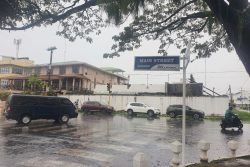Governments of member countries of the Caribbean Community (CARICOM), all too frequently, find themselves in the unhappy position of having their promises meet with healthy doses of skepticism from the people of the region, that condition having derived from what has become an ingrained propensity on the part of those governments to ‘chalk up’ unfulfilled undertakings.
The simple truth is that a considerable trust deficit has grown out of a surfeit of broken promises, including those that have to do with previous regional food security undertakings.
Here it has to be said that Guyana has been in ‘the thick of things’ when it comes to vociferously articulated regional food security undertakings that have ended up being deposited in the dustbins of the undelivered.
The difference in the present instance of the promised creation of a Regional Food Security Terminal is that the current undertaking comes against the backdrop of recently disclosed concerns over food security in some territories in the region, concerns which we in the Caribbean have always felt did not apply to us but to other faraway parts of the globe.
What is now believed to be a real concern over the future of food security in the Caribbean is manifested in the level of attention which appears to have been assigned to undertakings like 25 x 2025, a ‘commitment’ expressed by CARICOM governments to reduce extra regional food imports by 25% by 2025. Here it has to be said that the results of a poll taken across the region regarding the likely realization of the 25×2025 undertaking ought to make interesting reading.
These days, the widely publicized promise of the creation of a regional food terminal is being closely followed by pockets of Caribbean people, presumably, particularly those from countries in the region which had been declared last year to have been afflicted by the food insecurity condition. That disclosure would likely have altered perceptions here in the region of the concept of food insecurity. Whereas, previously, food insecurity had been a term which we had only briefly contemplated before moving on, the official disclosure that we too (or at least some of us) are vulnerable to food insecurity have caused us to view the concept differently.
It is this that has caused the matter of the promised Food Security Terminal to get the attention of the people of the Caribbean. The disclosure by the World Food Programme that the Caribbean was not, after all, exempt from food insecurity gave an altogether different meaning to the idea of the setting up of a Regional Food Security Terminal.
We have come to understand (or, at least, hopefully so) that food insecurity was no longer a grotesque, far off phenomenon from which we in the Caribbean are exempted. Like nothing previously, the idea of a Food Security Terminal here in the Caribbean would appear to have made the point that we too are vulnerable.
With regard to our own Food Security Terminal the assigning of the task of spearheading the execution of the project to Prime Minister Mia Mottley, has to do, largely, with her acknowledged capabilities and energies and a general feeling in much of the region that if anyone can ‘pull off’ the creation of the Food Terminal, she can. That said, the point must also be made that assurances of a Regional Food Terminal can hardly be provided in the absence of a significant contribution from Guyana (which is where much of the food will have to come from, in the first place) though it can hardly be denied that Guyana has been associated with previous ‘tilts’ at strengthening the food security bona fides of the region that have turned out to be ‘false starts.’
What is true about the current planned Regional Food Security Terminal is that the launch of the project has come with much hype, a circumstance that causes some of us to recall the saying that the noise in the market is not the sale. The reality of conditions of real food insecurity in parts of the region, at this time, compel us to take a different approach. This time around there is need for far less shouting and much more doing. If we fail now the consequences are probably likely to be much more serious than might have previously been the case for the now food-insecure countries of the region.
President Irfaan Ali’s remark (Guyana Chronicle August 20, 2022) that “it is time to do more than just talk about what can be done to advance the region’s goal of reducing the food import bill” would certainly have applied to previous regional leaders, and here Guyana, particularly, cannot be excluded. Whether or not we have learnt anything from that era is, truth be told, still unclear.
A question that arises here is whether, currently, the incremental advances being made, presumably, towards the full and final creation of the Food Security Terminal, including information on just how it will work in practice, is not a matter that should be addressed far more directly, more intensely, by CARICOM Heads themselves.
There can be, one feels, no good reason, given the level of urgency that is associated with the startup of the Food Security Terminal, why there does not appear to be, at this time, a countdown to the full operationalization of the Terminal. That countdown ought to address the Terminal’s operational details and should be placed conspicuously, in the public domain, across the Caribbean. We have arrived at a juncture where there is need for the people of the region to be provided with reliable information regarding the rate at which the creation of the Terminal is traveling towards full and final operationalization. Contextually, what we need, and now, are regular updates from CARICOM regarding critical timelines that lead to the realization of a ready-for-use Regional Food Security Terminal. This would at least serve as a measure of ‘pushback’ against the justifiable claims commonly made by the people of the region that insofar as grand promises are concerned, our governments have ‘served up’ far too many previous woeful letdowns.




